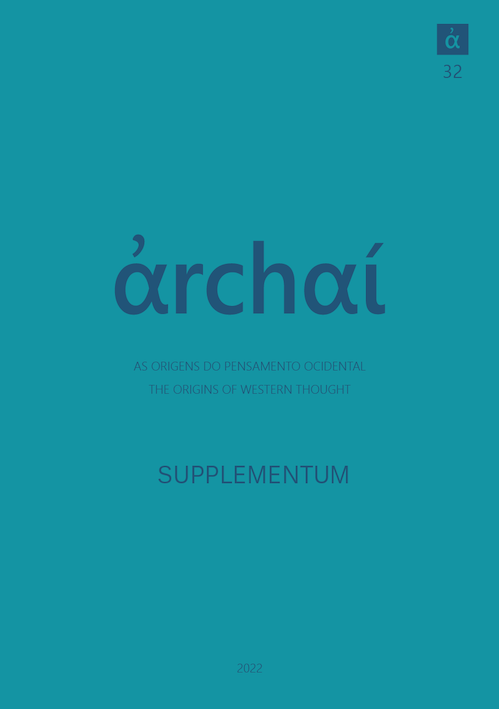Introduction to Studies on Plato’s Lysis
DOI:
https://doi.org/10.14195/1984-249X_32_36Palavras-chave:
Lysis, Plato, Studies, Archai, supplementumResumo
Plato’s Lysis shows Socrates in conversation with two boys he has met at a wrestling school, Lysis and Menexenus. Their debate revolves around the notion of philia, seeking to pin down the nature of this relation, who or what takes part in it, and what causes it. The word philiahas usually been translated as “friendship” but has a wider application in this dialogue, as it encompasses a variety of friendly and loving attitudes toward both people and things. The kinds of interpersonal philia evoked include erotic attachments, kinship relations, utility-based relations, and playful companionship. Roughly two-thirds into the dialogue, the focus turns to a more general theory of desiderative attachments and the question of their ultimate telos and cause. The conversation ends, at least on the face of it, in an impasse, an aporia, when the interlocutors find themselves thrown back to the point from where they started, and no attempt to answer the question of what philia is or what motivates it has stuck. The Lysis nevertheless offers many incentives for further discussion and has elicited radically different responses from its interpreters as to what its real message is. For instance, does it promote a form of utilitarian egoism according to which human attachment can never, or should never, be altruistically motivated? Or does it hint at a very different concept of interpersonal love based on the idea that friendship, as it were, completes us since it connects us with those that share the same values? Does this dialogue stay within the familiar ambit of Socratic ethics, centered around the question of what it takes to achieve happiness (eudaimonia) in a human life, without a concern for metaphysical questions? Or, quite the contrary, does its discussion of the highest object of love (to proton philon) point forward to the metaphysical program of Plato’s so-called middle-period dialogues and especially to the notions of the form of the good or the form of the beautiful, notions which are at the center of the Republic and the Symposium? These questions and others will continue to be debated about this puzzling dialogue. The essays assembled in the present volume address many of these topics.
Downloads
Referências
COMSTROCK, R.; ANDERSON, T. (2022). “Cutting them down to size: Humbling and protreptic in Plato’s Lysis In: JENNINGS, D.; SZAIF, J. (eds.), Studies on Plato’s Lysis, special issue of Archai 32, suppl. 1.
DERETIC, I. (2022). Egoism, Utility, and Friendship in Plato’s Lysis In: JENNINGS, D.; SZAIF, J. (eds.), Studies on Plato’s Lysis, special issue of Archai 32, suppl. 1.
JENNINGS, D. (2022). The akin vs. the good in Plato’s Lysis. In: JENNINGS, D.; SZAIF, J. (eds.), Studies on Plato’s Lysis, special issue of Archai 32, suppl. 1.
JENNINGS, D.; SZAIF, J. (eds.) (2022), Studies on Plato’s Lysis, special issue of Archai , 32, suppl. 1.
PAYNE, A. (2022). Philia as Fellowship in Plato’s Lysis In: JENNINGS, D.; SZAIF, J. (eds.), Studies on Plato’s Lysis, special issue of Archai 32, suppl. 1.
ROOCHNIK, D. (2022). Plato’s Lysis and the Erotics of Philia In: JENNINGS, D.; SZAIF, J. (eds.), Studies on Plato’s Lysis, special issue of Archai 32, suppl. 1.
SZAIF, J. (2022). Aporetic Discourse and Protreptic in Plato’s Lysis In: JENNINGS, D.; SZAIF, J. (eds.), Studies on Plato’s Lysis, special issue of Archai 32, suppl. 1.
Downloads
Publicado
Como Citar
Edição
Seção
Licença
Copyright (c) 2023 Jan Szaif, David Jennings

Este trabalho está licenciado sob uma licença Creative Commons Attribution 4.0 International License.
Dado o acesso público desta revista, os textos são de uso gratuito, com obrigatoriedade de reconhecimento da autoria original e da publicação inicial nesta revista. O conteúdo das publicações é de total e exclusiva responsabilidade dos autores.
1. Os autores autorizam a publicação do artigo na revista.
2. Os autores garantem que a contribuição é original, responsabilizando-se inteiramente por seu conteúdo em caso de eventual impugnação por parte de terceiros.
3. Os autores garantem que a contribuição que não está em processo de avaliação em outras revistas.
4. Os autores mantêm os direitos autorais e concedem à revista o direito de primeira publicação, sendo o trabalho licenciado sob a Creative Commons Attribution License-BY.
5. Os autores têm permissão e são estimulados a publicar e distribuir seu trabalho on-line após a publicação na revista.
6. Os autores dos trabalhos aprovados autorizam a revista a, após a publicação, ceder seu conteúdo para reprodução em indexadores de conteúdo, bibliotecas virtuais e similares.
7. É reservado aos editores o direito de proceder ajustes textuais e de adequação do artigo às normas da publicação.



